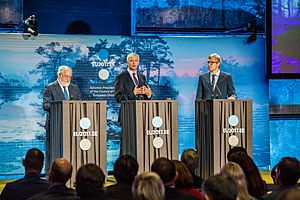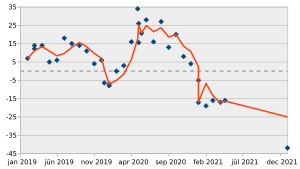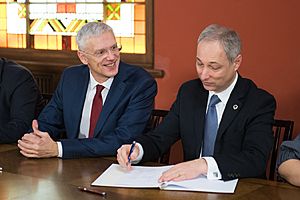Krišjānis Kariņš facts for kids
Quick facts for kids
Krišjānis Kariņš
|
|
|---|---|
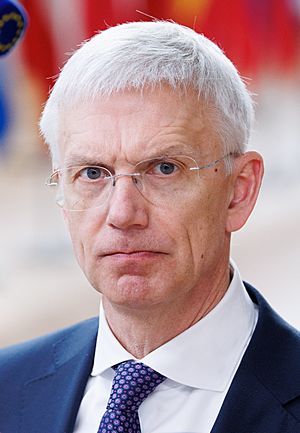
Kariņš in 2023
|
|
| 23rd Prime Minister of Latvia | |
| In office 23 January 2019 – 15 September 2023 |
|
| President | |
| Preceded by | Māris Kučinskis |
| Succeeded by | Evika Siliņa |
| Minister of Foreign Affairs | |
| In office 15 September 2023 – 10 April 2024 Acting: 8 July – 15 September 2023 |
|
| Prime Minister |
|
| Preceded by | Edgars Rinkēvičs |
| Succeeded by | Baiba Braže |
| Member of the European Parliament | |
| In office 14 July 2009 – 23 January 2019 |
|
| Constituency | Latvia |
| Minister for Economics | |
| In office 2 December 2004 – 7 April 2006 |
|
| Prime Minister | Aigars Kalvītis |
| Preceded by | Juris Lujāns |
| Succeeded by | Aigars Štokenbergs |
| President of the Committee of Ministers of the Council of Europe | |
| In office 8 July 2023 – 15 November 2023 |
|
| Preceded by | Edgars Rinkēvičs |
| Succeeded by | Dominique Hasler |
| Member of the Saeima | |
| In office 5 November 2002 – 16 July 2009 |
|
| In office 25 April 2024 – 29 August 2024 |
|
| Personal details | |
| Born | 13 December 1964 Wilmington, Delaware, U.S. |
| Citizenship | Latvia, United States |
| Political party | New Era Party (2002–2011) Unity (2011–present) |
| Spouse | Anda Kariņa |
| Children | 4 |
| Education | St. John's College, Maryland University of Pennsylvania (BA, MA, PhD) |
| Signature | |
Arturs Krišjānis Kariņš, born on December 13, 1964, is a Latvian American politician. He served as the prime minister of Latvia from 2019 to 2023. Before that, he was Latvia's Minister of Economics and a member of the European Parliament. Kariņš was born in Wilmington, Delaware, United States. His parents had left Latvia during the Soviet occupation. He was very involved in the American Latvian community when he was young.
After studying linguistics at the University of Pennsylvania, Kariņš moved to Latvia in 1997. There, he started a business selling frozen foods. In 2002, he helped create the New Era Party. This party later joined with others to form the Unity Party, which is now called New Unity. Kariņš served in Latvia's parliament, the Saeima, and as Minister of Economics. He was also a Member of the European Parliament. In 2018, his party chose him to be their candidate for prime minister. Even though New Unity was the smallest party elected, Kariņš was asked to form a new government. He became prime minister on January 23, 2019, leading a group of five parties. He resigned as prime minister on August 14, 2023, because of disagreements within his government.
Contents
Early Life and Family Background
Krišjānis Kariņš was born in Wilmington, Delaware, in the United States. His parents were part of a Latvian American family. They had to leave Latvia in 1944 because of the Soviet occupation. They grew up, met, and got married in Sweden before moving to the United States. His father, Uldis, was an engineer who started his own company in Delaware in 1973.
Kariņš has said that he and his older sister were the only two children of Latvian background in their elementary school. His family was very active in the Latvian community in Delaware. They went to Latvian church and Sunday school, sang in Latvian choirs, and spent time at Latvian summer camps. When he was young, Kariņš played guitar and drums in a band with his Latvian friends. They played at events across the United States. He also took part in protests in Washington, D.C., against the Soviet occupation of Latvia. Kariņš first visited Latvia in 1984 and spent summers there until he moved to the country permanently in 1997.
Education and Business Ventures
After high school, Kariņš studied at the Münster Latvian Gymnasium in 1983. One of his teachers there was Egils Levits, who later became President of Latvia. From 1984 to 1986, Kariņš studied at St. John's College in Annapolis, Maryland. He then switched to a linguistics program at the University of Pennsylvania, where he graduated in 1988.
In 1990, he received a grant from the American government to study Russian in St. Petersburg. In 1994, he got another scholarship to study language sounds and teach sociolinguistics at the University of Latvia. In 1996, Kariņš earned his Ph.D. in linguistics from the University of Pennsylvania. He focused on how computers recognize speech.
Soon after, he moved to Latvia. He wanted to teach language but was told he didn't have enough teaching experience. Instead, he started a company called Lāču ledus, which made and sold ice and frozen foods. He ran this business until 2002. Kariņš has said that his difficult experiences with Latvian government rules while running his business inspired him to get involved in politics.
Political Journey
Early Political Roles
In the early 2000s, Einars Repše asked Kariņš to help start the New Era Party. Kariņš helped write the party's first plans. In October 2002, he was elected to the Saeima, which is Latvia's parliament. The New Era Party became the largest party in parliament. While in the Saeima, he worked on committees for education, culture, science, and the constitution. He also led the New Era party's group in parliament from 2002 to 2004.
When Prime Minister Einars Repše resigned in 2004, Kariņš was considered as a possible next prime minister. However, he was not chosen. Instead, he became the Minister for Economics from December 2004 to April 2006. In April 2006, there were concerns about his connection to a company that was accused of misusing money from the European Union. Although Kariņš initially did not want to resign, his entire New Era party left the government on April 6, 2006.
Kariņš was re-elected to the Saeima in October 2006. In March 2007, he became one of the two leaders of the New Era Party. In July 2011, the New Era Party merged with the Unity party, and Kariņš became a member of Unity. He remained a member when the party was renamed "New Unity" in April 2018.
Serving in the European Parliament
In July 2009, Kariņš became a Member of the European Parliament. This is a group of elected officials who represent citizens of the European Union. He was part of the Committee on Industry, Research and Energy. He also worked on the Committee on Economic and Monetary Affairs and a special committee on tax issues. In the Parliament, he was part of the European People's Party group, which is the largest political group. Kariņš was re-elected to the European Parliament in 2014.
In May 2015, Kariņš supported Latvia accepting its share of refugees proposed by the European Union. He believed that if Latvia helped other EU countries now, they would also help Latvia in the future if there was a crisis with migrants from Ukraine.
When Kariņš became prime minister, Aleksejs Loskutovs took his seat in the European Parliament.
Committee Work
- Industry, Research and Energy
- Committee of Inquiry into Emission Measurements in the Automotive Sector
- Special committee on financial crimes, tax evasion and tax avoidance
Becoming Prime Minister in 2019
On April 23, 2018, Kariņš was announced as New Unity's candidate for Prime Minister of Latvia for the 2018 election. He chose not to run for a seat in the Saeima, preferring to keep his seat in the European Parliament. Even though polls in July predicted that New Unity might not get enough votes to enter the Saeima, the party made a comeback. On October 6, they were elected with eight seats, making them the smallest of seven parties.
On January 7, 2019, Latvian President Raimonds Vējonis asked Kariņš to form the next government. This happened after other candidates had failed to form a stable government. Kariņš said his government would focus on improving the financial system, reforming education, fighting corruption, and fixing a controversial green energy fee. Some people asked Kariņš, who is a citizen of both the United States and Latvia, to give up his American citizenship while he was prime minister, but he did not.
Kariņš became prime minister on January 23, 2019. He led a group of five parties, including KPV LV, New Conservative Party, Development/For!, National Alliance, and New Unity.
2019 European Elections
Kariņš led his party in the 2019 European Parliament elections in Latvia. His party won 2 seats, down from 4.
2022 Prime Minister Candidacy
In June 2022, the New Unity party announced that Kariņš would again be their candidate for prime minister.
Prime Minister of Latvia
When he was confirmed as prime minister, Kariņš promised that his government would make steady improvements, not sudden big changes. He announced a seven-point plan. This plan focused on improving the financial sector, fighting corruption, continuing education reforms, improving healthcare, getting rid of a controversial green energy payment, reducing the number of local government areas, and dealing with population issues.
Domestic Policies
Financial System Changes
On June 13, 2019, the Saeima approved new rules. These rules allowed Latvian organizations to quickly put into action decisions made by the United Nations. They also reduced the number of members on the Financial and Capital Market Commission from five to three. These new members would be chosen by the parliament.
Education Reforms
When he became prime minister, Kariņš said his government would continue education changes planned by the previous government. These changes included:
- Reorganizing and closing schools with very few students.
- Gradually changing public high schools to teach only in Latvian.
- Introducing new teaching standards based on what students can do.
In February 2019, Kariņš announced that teachers' salaries would not increase in 2019 as previously promised. This led to protests and threats of a strike. Kariņš wanted to raise teachers' salaries without increasing taxes. He suggested finding money by closing schools with low student numbers. In April 2019, the government proposed new rules for the minimum number of students schools should have.
On April 23, 2019, Latvia's Constitutional Court decided that changing public schools to teach only in Latvian was allowed by the constitution. In June 2022, the Saeima approved a plan to speed up this change for preschool and primary schools, aiming to finish by 2025.
In September 2022, a teachers' strike was avoided. The Kariņš government and the teachers' union reached an agreement to raise teachers' salaries and balance their work hours.
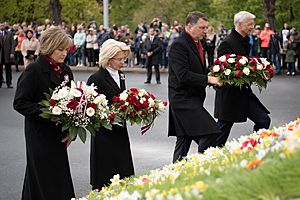
Healthcare System
In February 2019, the Kariņš government announced it would stop using a "two basket" system for healthcare funding. This system would have only given full state healthcare to people who paid social taxes. The government later said that both the healthcare system and tax rules would be changed in 2021.
Green Energy Payment
On April 11, 2019, Kariņš survived a vote that could have removed him from office. This vote was because he had not canceled a green energy payment by the end of March, as some in parliament demanded. He explained that canceling it so quickly was not legally possible.
Local Government Changes
On April 9, 2019, a plan was announced to reduce the number of local government areas in Latvia from 119 to 35. This plan was controversial. After some changes, the new system of 43 local government areas came into effect on July 1, 2021.
Foreign Policy
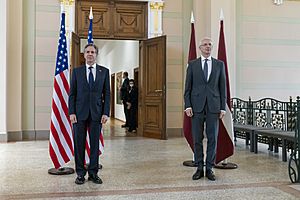
Kariņš, like leaders before him, focused on a foreign policy that looks towards Western countries. He also expressed caution about Russia's intentions. On January 7, 2019, he announced that Edgars Rinkēvičs would continue as Latvia's foreign minister. On February 8, Kariņš made his first foreign visit to Estonia, highlighting the importance of good relations between the two countries.
European Union Relations
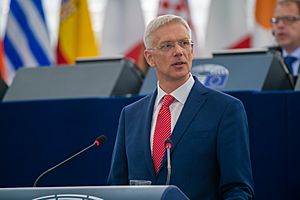
During his first official visit to Brussels on February 22, 2019, Kariņš confirmed that Latvia would continue its "Euro-Atlantic course." He also supported the Brexit negotiator, Michel Barnier. On April 17, he spoke to the European Parliament. He said it was important to understand why people listen to populist leaders.
In a meeting with other EU leaders in Sibiu, Romania, on May 9, he supported the process of choosing a new European Commissioner. Kariņš also represented center-right governments in talks about new leaders for the European Union after the 2019 European elections.
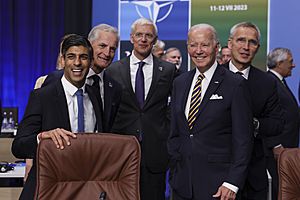
Relations with Belarus
During Kariņš' time as prime minister, relations with neighboring Belarus became very difficult. In January 2021, Kariņš said that Minsk should not host the 2021 IIHF World Championship because of the violent actions against peaceful protests in Belarus. In August 2021, a state of emergency was declared at the Belarus–Latvia border due to a large increase in people trying to cross. On August 23, Kariņš joined the prime ministers of Poland, Lithuania, and Estonia in saying that Belarusian president Alexander Lukashenko was using migrants to cause problems for neighboring countries.
Relations with Russia
Throughout Kariņš' time as prime minister, relations between Latvia and Russia became much worse, especially after the 2022 Russian invasion of Ukraine. In May 2022, Kariņš stated that for peace and security in Europe, Russia must lose the war and Ukraine must win. He also said that countries around the Baltic Sea should reduce economic cooperation with Russia, especially in energy. On August 25, 2022, a Soviet war memorial in Latvia was taken down. Kariņš said this action "freed Latvia from the lasting consequences of occupation." In September 2022, the Kariņš government approved more rules for Russian citizens entering Latvia. Kariņš said it was "unacceptable" for Russian citizens to move freely in the EU while Russia was invading Ukraine.
Support for Ukraine
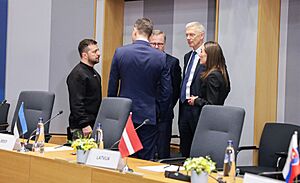
Under the Kariņš government, Latvia has strongly supported Ukraine in its conflict with Russia. On February 23, 2022, the day before Russia's invasion, Latvia sent FIM-92 Stinger missiles to the Ukrainian Armed Forces. On February 24, right after the invasion, Kariņš announced that Latvia was ready to take in 10,000 refugees. By August, over 36,000 Ukrainian refugees were registered in Latvia. Kariņš supported the European Council's decision in June 2022 to make Ukraine and Moldova candidates for EU membership. He said this would help them make important reforms. On March 16, 2023, he visited Kyiv and met with President Zelenskyy.
COVID-19 Pandemic Response
On March 12, 2020, Kariņš announced a state of emergency because of the COVID-19 pandemic. Schools were closed, and large gatherings were banned. This state of emergency ended on June 10. A second state of emergency was announced in November 2020 and ended in April 2021. In January 2021, Kariņš asked the Minister of Health, Ilze Viņķele, to resign because he felt her vaccination plan was not good enough. Daniels Pavļuts became the new Minister of Health.
A third state of emergency was declared in October 2021. On October 20, the Kariņš government put in place a month-long "lockdown" after requests from medical experts. The government also allowed employers to end contracts with employees who did not have a valid vaccination certificate or proof of recovery from COVID-19.
Initially, Kariņš was praised for how his government handled the early parts of the pandemic. However, as the situation continued and new outbreaks happened in late 2020 and 2021, his government faced criticism for its management of the pandemic. In October 2021, a group of experts stopped working with the government. They felt their advice was not being used to make informed decisions.
Resignation as Prime Minister
Kariņš announced his resignation as prime minister on August 14, 2023. He mentioned disagreements within the group of parties that formed his government. Evika Siliņa took over as prime minister on September 15, 2023.
Foreign Minister Role
Soon after he stopped being prime minister, Kariņš joined Siliņa's government as the foreign minister in September 2023. On November 28, he said he wanted to be the next Secretary General of NATO. He believed that NATO needed a leader who could build agreement, was committed to higher defense spending, and had a clear plan for dealing with Russia.
On March 28, 2024, Kariņš announced he was resigning as foreign minister, effective April 10. This decision came after the Latvian prosecutor general's office started a criminal investigation. The investigation was about the possible misuse of public money for private flights taken by Kariņš and his groups when he was prime minister. In April, Baiba Braže was confirmed as the new Minister of Foreign Affairs. Kariņš returned to work in the Saeima. In August, he announced he would suspend his role as a member of the Saeima.
Gaza Conflict
In November 2023, Kariņš said that Hamas was using Palestinian civilians as human shields in the Gaza war. Kariņš did not support a full ceasefire but said he supported "humanitarian pauses" to deliver aid to the people in Gaza.
Personal Life
Krišjānis Kariņš is married to Anda Kariņa, who is a doctor. They have four children.
In March 2019, a member of the Saeima asked officials to investigate a property deal involving Kariņš and his wife. The deal was with Russian citizens who had connections to Gazprom International and the Government of Moscow. There were claims that this deal could be related to money laundering and tax avoidance. However, on May 18, 2019, the state police announced that they would not start criminal proceedings because they found no signs of illegal activity.
Besides his native Latvian and English, Kariņš speaks fluent German and French. He also understands some Russian. During a visit to Minsk in January 2020, Kariņš mentioned that it is easier for him to understand Russian than to speak it. Because of this, he often uses an interpreter when speaking with Russian speakers to make sure he says things correctly.
See also
 In Spanish: Arturs Krišjānis Kariņš para niños
In Spanish: Arturs Krišjānis Kariņš para niños
 | Georgia Louise Harris Brown |
 | Julian Abele |
 | Norma Merrick Sklarek |
 | William Sidney Pittman |


